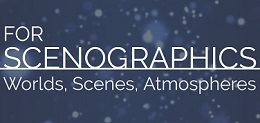Home » For and about students » Training and support » Techne Confluxes
Techne Confluxes
A Techne Conflux is an extended training, development, exhibition or performance programme which aims to enhance research or intellectual skills, or facilitate the sharing of expertise amongst doctoral students in the arts and humanities.
Current and Upcoming Confluxes
Scenographics: Acts of worlding

Led by Dr Donatella Barbieri (University of the Arts London)
The principal aim of this Conflux is to bring together PGR, academics and practitioners to investigate how ‘scenographics’ (Hann 2018) enact, speculate, or complicate orders of ‘world’. This overall aim breaks down into three key learning objectives for the PGR:
- Introduction to the potential of scenography and scenographics as a conceptual lens in the interdisciplinary crafting of ‘scenes’, ‘worlds’, and ‘atmospheres’.
- Reflect on the impact of ‘new materialist’ thinking for the interdisciplinary study of staged material cultures, such as interior design and visual merchandising as well as gardening and installation art.
- Consider the case for scenography and scenographics as a sister strategy – alongside dramaturgy and choreography – as a formative practice and affective trait of staged material cultures.
This line of enquiry builds upon the concept of ‘worlding’ first introduced by Heidegger and more recently refined by the anthropologist Kathleen Stewart. Worlding stresses the incessant processes that construct, re-constitute and affect how orders of world are experienced. Building on the critical frameworks that inform notions of ‘vital materialism’ (Bennett 2009) as well as ‘creative geographies’ (Hawkins 2014) and ‘affective atmospheres’ (Anderson 2011; Böhme 2013), this Conflux composes three expert workshops with invited scholars and practitioners that introduce and debate the key concepts through a combination of seminars, practical exercises and short lectures. These small group tasks and discussions will inform the curation and focus of an open symposium, which marks the end of the Conflux.
Conflux website: http://scenographics.rachelhann.com/
Writing & Art

Whether you sign up for one of the Writing Days, or all four, the following questions may be tackled: what academic prose style is productive for my thesis? what is the relationship of this prose style to what I might publish? how to write about creative practice without cauterising it? how to relate art theory to art practice? how to write about my own creative practice? what different voices does my thesis require? what writing tips can I learn from leading voices across a variety of fields?
Rethinking archival research, methods and practice
Led by Dr Deborah Madden (University of Brighton)
Conflux website: https://technearchiveconflux.wordpress.com/
Embodied Health: Monsters, Methods and Creative Practice
Led by Dr Donna McCormack (University of Surrey)
This Conflux explores arts- and humanities-based research, methods and creative practices in the fields of health and medicine. It takes difference and anomalous bodies as its starting point to situate contemporary research, methods and practice in the growing field of monster studies and to address what monster theory may offer to our thinking on health, medicine and technology. The Conflux will give participants the opportunity to explore potentially new creative methods and practices, as well as more traditional analytical and critical approaches, with experts in health-based research and creative health practices. Finally, it will enhance knowledge of interdisciplinary collaborative research across the arts and humanities and medicine and health.
Queer Feminist Currents

Led by Dr Eleanor Roberts (University of Roehampton)
This queer feminist Conflux series will galvanize and extend an established research culture of queer feminist scholarship and practice in the arts and humanities, through a series of events aimed at graduate students at Techne institutions. Each event will be focused on the reading of key contemporary queer feminist texts (‘texts’ here includes a number of possible forms including scholarly texts, artworks, and other materials) and workshops on politically urgent key topics with interdisciplinary relevance. The series will interrogate the key points of convergence and tension in contemporary queer, intersectional feminist and gender studies, decolonial critique, as well as theory and practice as interrelated. A diverse range of speakers will represent queer feminist work across a number of disciplinary areas including critical race theory, visual art and culture, theatre studies, performance studies, dance, philosophy, sociology, history, creative writing, and postcolonial theory. The series will be programmed on a decentering principle, including the vital work of scholars and practitioners of colour and ethnic minorities, spanning a range of geographic and formal spaces. In a queer feminist mode, it will provide a forum for in-depth engagement and exchange about the latest ideas, and conversations between established world-leading figures and early career research and practice.
Conflux website: https://queerfeministcurrents.wordpress.com
Led by Prof. Veronica Rodriguez-Blanco (University of Surrey)
